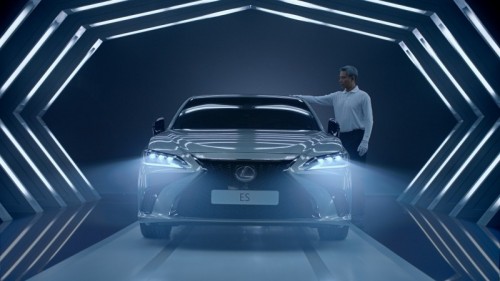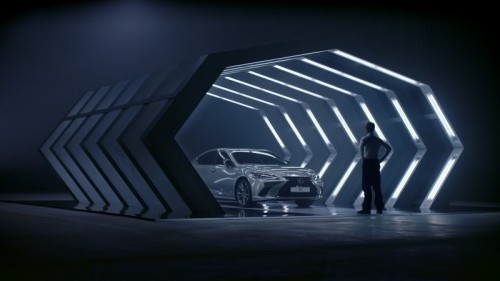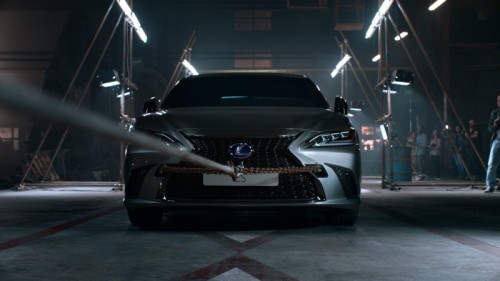Lexus has leveraged IBM Watson to create the first ever script written by Artificial Intelligence which was then used and directed by Oscar-winning filmmaker Kevin Macdonald, whose credits include ‘The Last King of Scotland,’ the Whitney Houston biopic ‘Whitney’ and the Oscar-winning documentary ‘One Day in September’.
This world-first collaboration between AI and a renowned craftsman aimed to test the boundaries of how humans and machines can work together in perfect harmony, exploring the importance of intuition in the relationship between the two to showcase the responsive features of the new Lexus ES executive sedan.
The result is an engaging short drama: a minute-long film telling the story of a Lexus Takumi Master Craftsman who completes his painstaking work and releases the new Lexus ES into the world, only for it to be taken away and threatened with destruction. At the crucial moment, the car’s automatic emergency braking system cuts in to save the day, demonstrating the value and effectiveness of the intuitive technology built into the car.
The innovative creative approach to the project is perfectly aligned with the qualities of the new ES, a car that is constantly aware of and instantly responsive to the driver’s intentions and changing road and traffic conditions. This is witnessed at a fundamental level in the agility, poise and strength of the ES’s new GA-K (Global Architecture – K) platform, and in the intelligent operation of its Lexus Safety System+ functions. These can recognise hazards and automatically initiate braking, steering and driver alerts to prevent an accident from happening, or reduce the consequences if a collision does occur.

Lexus’ creative agency The&Partnership London collaborated with technical partner Visual Voice to create the AI scriptwriter, using IBM Watson to analyse a range of external audio, text and visual data and extract insight on what makes content award worthy from which the AI could contribute to the creation of a script outline that would be emotionally intelligent and entertaining for the audience. Once this process evolved, Kevin Macdonald was approached to direct the work and bring the story to life.
To produce the original story, the AI was “trained” with 15 years’ worth of car and luxury advertisements that have won prestigious Cannes Lions international awards for creativity. It was also primed with emotional intelligence data by video marketplace Unruly to learn which moments connected most strongly with viewers and understand how actions, objects, locations and emotionality are used in different combinations and sequences to communicate the desired messages.
In using so much information about previous adverts, it was important to avoid the risk of producing something that felt familiar, or too mass-market in tone. Thus additional data on the Lexus brand and the project guideline were input into the AI to keep the script original and on-brand.

Macdonald was immediately intrigued by the concept and recognised how it required a different approach from a conventional film. He said: “When I was handed the script, the melodrama of the story convinced me of its potential. The fact the AI gave a fellow machine sentience, placed it in a sort of combat situation, and then had it escaping into the sunset was such an emotional response from what is essentially a digital platform. The charmingly simplistic way the AI wrote the story was both fascinating in its interpretation of human emotion, and yet still unexpected enough to give the film a clearly non-human edge.”
Alex Newland, Co-Founder of Visual Voice, said: “This was both a highly challenging and deeply fascinating project to have had the privilege to be a part of. From the outset, it was almost impossible to know what level of quality or intelligibility the AI would produce.
“To see the project brought together with such a rich finished piece is extremely satisfying and exciting to witness. We believe this project moves AI-generated content into the beginnings of true, stand-alone creative merit.”
To focus closely on the “intuitive” aspect of the story, the AI was further coached with intelligence from a bespoke experiment conducted by MindX, the applied science division of the University of New South Wales in Australia. This explored what makes someone intuitive and how people who have a high level of intuition respond to car adverts.
The result is a script that is rich in genuine human emotion and undistinguishable from one written by a human, bar some unexpected details. For example, AI gives the character of the car sentience and a surprising emotional depth, while appearing to treat human behaviour, such as the habit of watching disasters unfold from behind a screen, with a degree of healthy cynicism.
Dave Bedwood, Creative Partner at The&Partnership, said: “I thought I’d be writing an ad with the assistance of AI. Instead it took over and wrote the whole script: a machine telling the story of a machine coming to life. Much AI work to date has been interesting because of the process itself; this has been because the end product is good in its own right.”
Vincent Tabel, Senior Manager Brand and Communications, Lexus Europe, said: “Here at Lexus we love to push the boundaries of technology and design, and that’s why we wanted to do something completely different – a world first – to launched the new Lexus ES. The ES is both intuitive and innovative, so we wanted the advert to reflect this. The resulting film surpasses our expectations of what an AI is capable of, from its creativity to its human emotion.”
Reece Medway, Media and Entertainment Specialist, IBM Watson, UK and Ireland said: “We applaud Lexus, Visual Voice and The@Partnership for being first movers in harnessing the power of Watson AI and analytics as a springboard for the creative process. The magic of storytelling will always come to life in the human creative process, and using Watson to identify the common attributes for truly award winning creative work is an example of how man and machine will collaborate in the AI era. It was a privilege to be part of this process”
Other posts by Mark Leo







